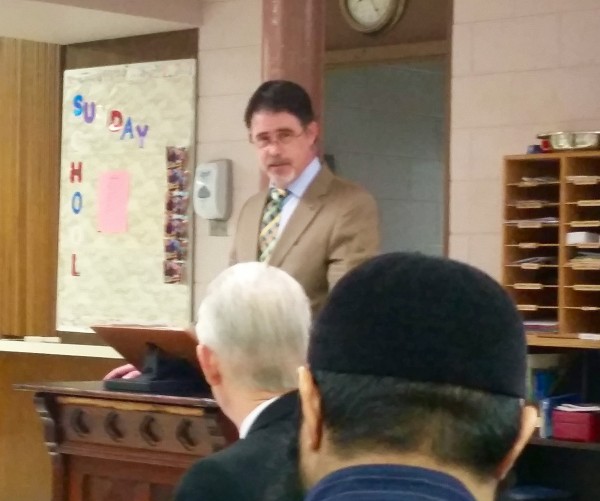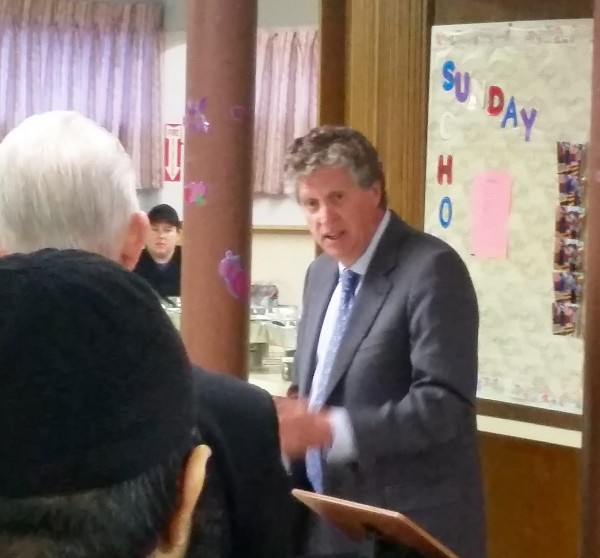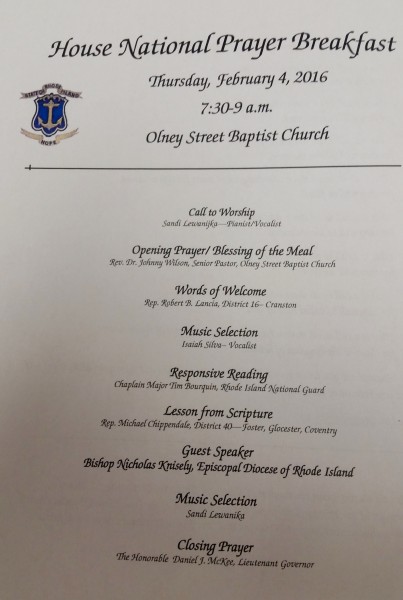 Rep. Aaron Regunberg and Sen. Harold M. Metts have introduced legislation to reform the controversial use of solitary or “segregated” confinement in the Rhode Island prison system, saying the practice causes psychological damage and often exacerbates the very problems it is intended to address.
Rep. Aaron Regunberg and Sen. Harold M. Metts have introduced legislation to reform the controversial use of solitary or “segregated” confinement in the Rhode Island prison system, saying the practice causes psychological damage and often exacerbates the very problems it is intended to address.
“The United Nations has condemned the use of solitary confinement, saying it can amount to torture,” said Representative Regunberg (D-Dist. 4, Providence). “And the research is very clear that prolonged solitary confinement causes psychological problems that can damage inmates’ chances of rehabilitation. It’s a vicious cycle that is destructive rather than corrective, and it particularly impacts already vulnerable populations, including the very high proportion of our prison population affected by mental illness. Add this to the fact that segregation units are by far the most expensive facilities to operate, and it should be clear that we need to put responsible limits on, and devise humane alternatives to, the use of solitary confinement in the prison system.”
Said Senator Metts (D-Dist. 6, Providence), “We cannot in good conscience call our prison a ‘corrections’ institute when the system relies on a punishment that is essentially designed to cause mental breakdown, particularly when so many of those subjected to it are already mentally ill. We have a moral imperative, as well as a constitutional mandate, to ensure we are not employing cruel or unusual punishment, and it is time we recognized that solitary confinement, in many cases, is cruel. Its use must be limited, and our prison system must stop using it on people who are particularly susceptible to the lasting effects it can have. We have to strive to find a better balance between rehabilitation and punishment.”
Many studies have found that long-term solitary confinement can produce psychological damage with symptoms such as hallucinations, hypersensitivity to noise or touch, paranoia, insomnia, post-traumatic stress disorder (PTSD), increased suicide risk and uncontrollable rage or fear. The risks are higher for juveniles, whose brains are still developing, and for those with mental illness.
Those effects can result in inmates having more difficulty complying with prison rules, defeating the purpose of solitary confinement. Even those who aren’t mentally ill when they enter solitary confinement can be left with lasting psychological effects that they take with them when they are released from prison into the community.
“Solitary confinement is cruel and unusual punishment,” said S, a current inmate at the ACI who has asked to remain unidentified for fear of retribution. “I have seen people get years in segregation, and get locked in solitary for non-problematic reasons, like identifying as LGBTQ, filing lawsuits, or sharing political views. I have witnessed people in solitary confinement break down, start talking to themselves, become paranoid, play with their own feces, and worse. When you go to High Security [the solitary confinement facility] for causing a problem, they don’t help you, they don’t give you any mental health services, they just lock you in a cell for 23 hours a day. So when you go back to the normal facilities, you’re worse off.”
The legislation would prohibit the use of solitary confinement — also called “segregated confinement” — for specific vulnerable populations, ensure that conditions in segregation are humane, and limit the use of solitary confinement for all inmates to 15 consecutive days, and no more than 20 days within any 60 day period.
The bill (2016-H 7481) has support from a wide array of inmates’ rights activists, mental health advocates, civil rights groups and families of incarcerated individuals.
“Solitary is a very dehumanizing experience that leaves a person broken and unable to function,” said John Prince, a member of Direct Action for Rights and Equality with first-hand experience of solitary confinement in the ACI. “You hear nothing, see nothing, have nothing to think about almost 24 hours a day. You lose all perspective of time. Human beings are not meant to live like that for weeks or months on end. My experiences in solitary were extremely painful, and I have many friends who were left unable to relate to people, even their families, after prolonged segregation. There have to be limits that keep this from being used for long periods or on people who are likely to suffer lasting damage from it.”
“Even mentally healthy people lose their faculties in solitary confinement, but for people with mental illness, it is a particularly unhealthy situation that impairs an individual’s ability to maintain healthy relationships,” said Michael Cerullo, a psychotherapist with extensive clinical experience in the juvenile and adult criminal justice system. “Without positive relationships in the community and with oneself, meaningful rehabilitation is significantly compromised. People with mental illness suffer serious trauma that cannot be undone when they are released either back into the prison population or back into the community, and that damage has ill effects on them and the people around them. We have to stop using this counterproductive approach with human beings challenged by mental illness for their sake and for the sake of the whole community.”
“Across the country, states are reducing their reliance on solitary confinement,” said Steven Brown, Executive Director of the Rhode Island ACLU. “Long-term isolation costs too much, does nothing to rehabilitate prisoners, and exacerbates mental illness — even in those who were healthy when they entered solitary. More than a century ago, the U.S. Supreme Court noted not only the extreme toll solitary confinement takes on those subjected to it, but that those who are affected may never recover well enough to reintegrate well into the community. Yet, the use of solitary confinement persists. States that once relied heavily on solitary confinement are now instead focusing on policies that promote safe communities and fair treatment — at the same time saving their states millions and reducing violence in the prisons. It’s time for us to do the same here in Rhode Island.”
The House bill has 38 cosponsors, including Representatives Scott A. Slater (D-Dist. 10, Providence), Jean Philippe Barros (D-Dist. 59, Pawtucket), Raymond A. Hull (D-Dist. 6, Providence, North Providence) and David A. Bennett (D-Dist. 20, Warwick, Cranston).
[From the press release]

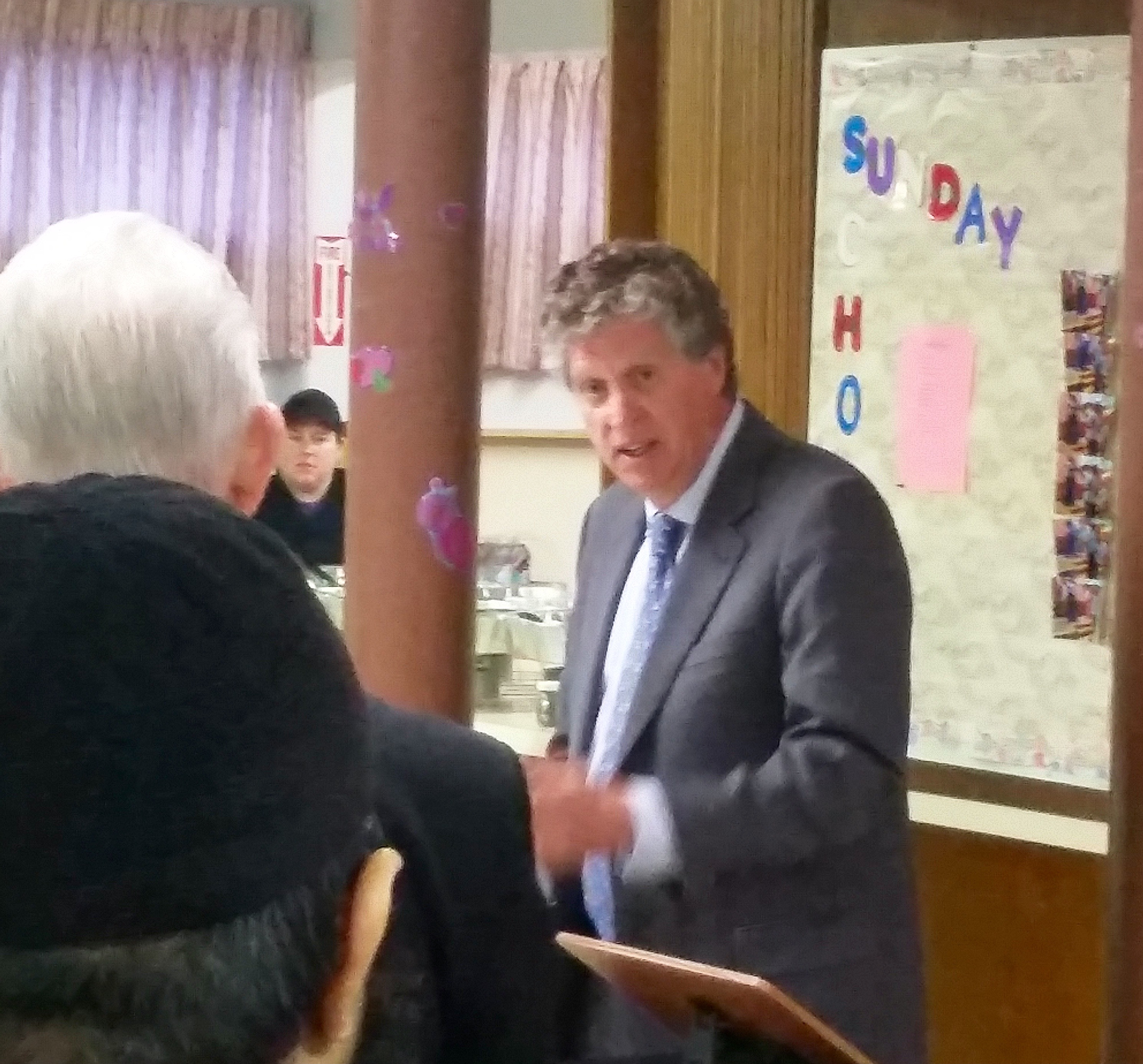
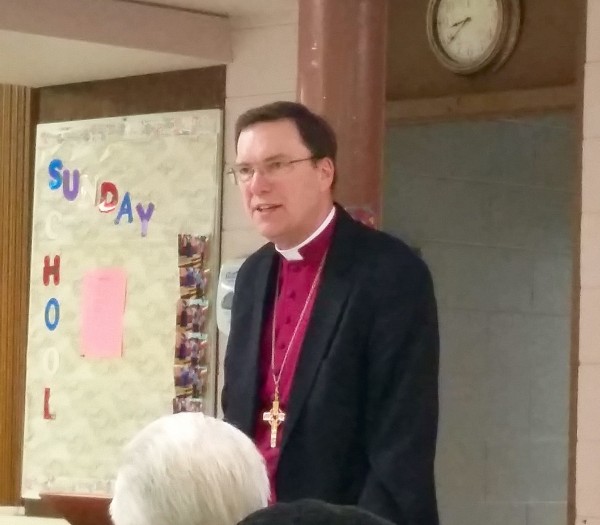
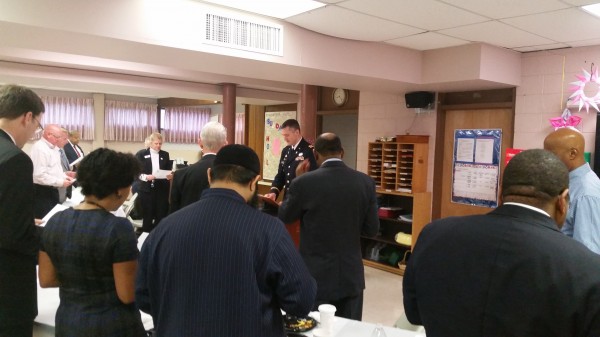 Guest speaker Bishop Nicholas Knisely of the Episcopal Diocese of Rhode Island concurred with Lancia. He also hopes that this event might be the first of a series of such breakfasts, a chance to bring legislators together not as government officials, “but as people who have a commitment to a spiritual life.” Such connections, said Knisely, “maybe cannot be made in any other way.”
Guest speaker Bishop Nicholas Knisely of the Episcopal Diocese of Rhode Island concurred with Lancia. He also hopes that this event might be the first of a series of such breakfasts, a chance to bring legislators together not as government officials, “but as people who have a commitment to a spiritual life.” Such connections, said Knisely, “maybe cannot be made in any other way.”